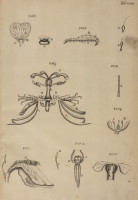Plant flowers
Date
1674
Creator
Marcello Malpighi (1628 - 1694, Italian) , Physician
Object type
Archive reference number
Manuscript page number
p127r
Material
Dimensions
height (page): 318mm
width (page): 230mm
width (page): 230mm
Subject
Content object
Description
Sectional studies of the flowers of various plant species viewed under magnification, including:
Figure 167 [upper left]: Lily, Lilium, peach tree, Prunus persica, and buttercup, Ranunculus, referred to by Malpighi as Lilio, Malo armeniaca, and Ranunculo.
Figure 168 [upper centre and right]: White dittany, Dictamnus albus, referred to as Dictamni albi.
Figure 169 [centre left]: Passiflora, referred to as Maracot Indorum.
Figure 170 [centre right]: Pumpkin, Curcubita, referred to as the same.
Figure 171 [lower left]: Iris, referred to as Iride.
Figure 172 [lower centre]: Birthwort, Aristolochia, referred to as Aristolochiae longae.
Figure 173 [lower right]: Primrose, Primula vulgaris, referred to as Primula veris.
Figure 174 [centre right]: Grape vine, Vitis, and Persian lily, Fritillaria persica, referred to as Vite and Lilio Persico respectively.
Each drawn on an individual slip of paper and arranged on the page for printing. Inscribed: ‘Tab. XXIX’ in top right-hand corner.
Page 127 from MS/103/1, later published as Tab. XXIX in Marcello Malpighi's Anatome plantarum (1675).
Marcello Malpighi (1628-1694), Italian biologist and physician, was elected a Fellow of the Royal Society in 1669.
Figure 167 [upper left]: Lily, Lilium, peach tree, Prunus persica, and buttercup, Ranunculus, referred to by Malpighi as Lilio, Malo armeniaca, and Ranunculo.
Figure 168 [upper centre and right]: White dittany, Dictamnus albus, referred to as Dictamni albi.
Figure 169 [centre left]: Passiflora, referred to as Maracot Indorum.
Figure 170 [centre right]: Pumpkin, Curcubita, referred to as the same.
Figure 171 [lower left]: Iris, referred to as Iride.
Figure 172 [lower centre]: Birthwort, Aristolochia, referred to as Aristolochiae longae.
Figure 173 [lower right]: Primrose, Primula vulgaris, referred to as Primula veris.
Figure 174 [centre right]: Grape vine, Vitis, and Persian lily, Fritillaria persica, referred to as Vite and Lilio Persico respectively.
Each drawn on an individual slip of paper and arranged on the page for printing. Inscribed: ‘Tab. XXIX’ in top right-hand corner.
Page 127 from MS/103/1, later published as Tab. XXIX in Marcello Malpighi's Anatome plantarum (1675).
Marcello Malpighi (1628-1694), Italian biologist and physician, was elected a Fellow of the Royal Society in 1669.
Object history
Marcello Malpighi’s research on the anatomy of plants was encouraged and supported by the Royal Society, as evidenced by correspondence between him and the then-Secretary, Henry Oldenburg FRS (1619-1677) in the 1660s and 1670s [MS/103/1].
An abstracted version of his work in this area was first read at a Society meeting on 7 December 1671 [JBO/4, pp.216-217]. The full manuscript of Anatome Plantarum, together with the frontispiece artwork and these plates, was received and read on 28 January 1674/75 [MS/103/1-2].
It was ordered for printing by the Society’s printer John Martin in June 1675 [CMO/1/221]. The published work consists of the text of Anatome Plantarum and De ovo incubato as an appendix, and 61 plates illustrating each [54 and 7 respectively].
An abstracted version of his work in this area was first read at a Society meeting on 7 December 1671 [JBO/4, pp.216-217]. The full manuscript of Anatome Plantarum, together with the frontispiece artwork and these plates, was received and read on 28 January 1674/75 [MS/103/1-2].
It was ordered for printing by the Society’s printer John Martin in June 1675 [CMO/1/221]. The published work consists of the text of Anatome Plantarum and De ovo incubato as an appendix, and 61 plates illustrating each [54 and 7 respectively].
Related fellows
Marcello Malpighi (1628 - 1694, Italian) , Physician
Associated place
